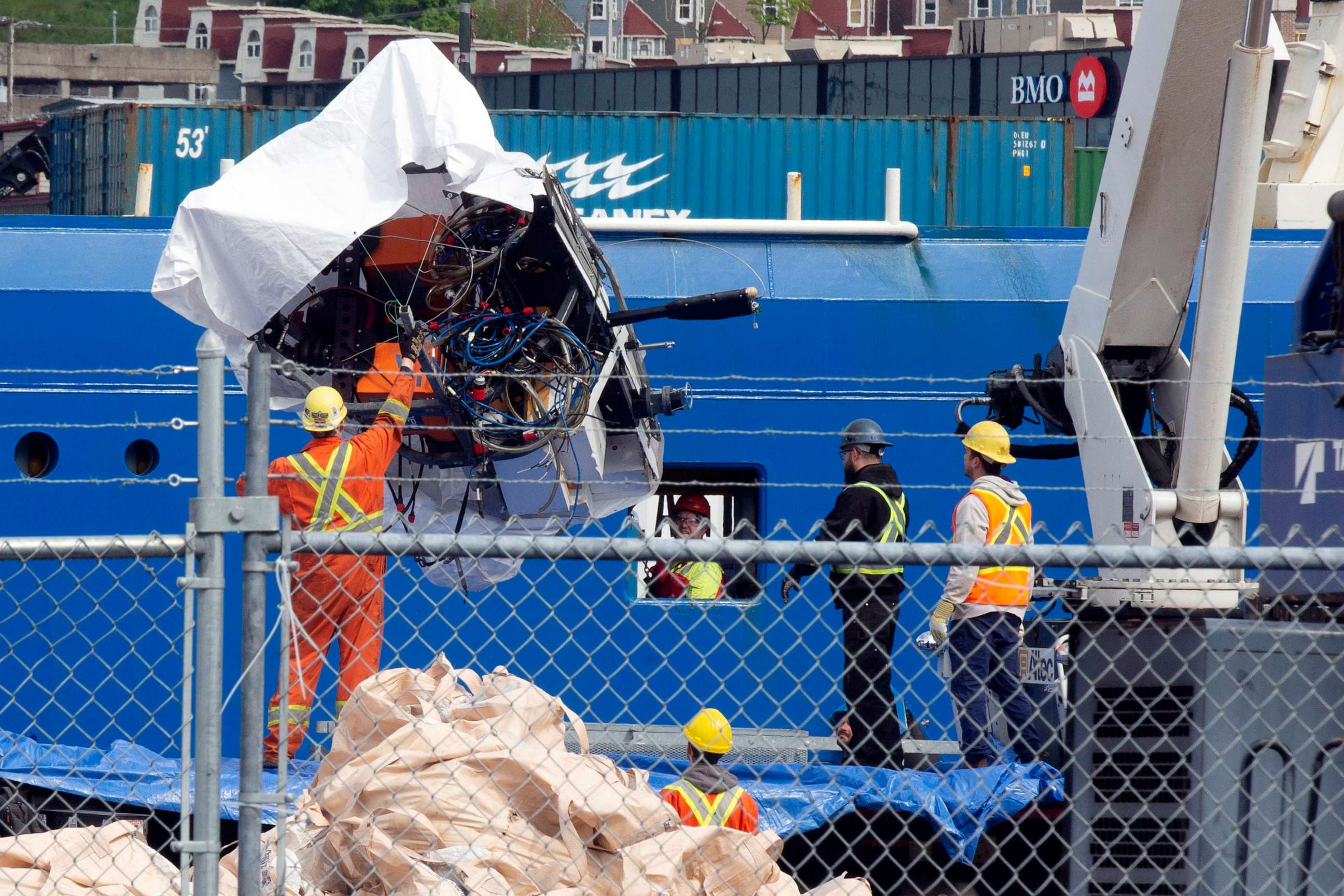Salvaged debris from Titan submersible contains 'presumed human remains': US Coast Guard
The evidence will be analyzed by the Marine Board of Investigation.
Debris recovered from the submersible that catastrophically imploded while on a voyage to see the Titanic wreckage last week contained "presumed human remains," the U.S. Coast Guard said.
Salvaged pieces of the Titan vessel were unloaded from the Canadian ship Horizon Arctic at the Canadian Coast Guard pier in St. John's, Newfoundland, Wednesday morning.


The U.S. Coast Guard said later Wednesday it has received the debris and evidence, including "presumed human remains," that had been recovered from the ocean floor in the incident, in which five people died.
The evidence will be transported to a port in the U.S. for "further analysis and testing" by the Marine Board of Investigation, the Coast Guard said.
"The evidence will provide investigators from several international jurisdictions with critical insights into the cause of this tragedy," Marine Board of Investigation Chair Capt. Jason Neubauer said in a statement. "There is still a substantial amount of work to be done to understand the factors that led to the catastrophic loss of the TITAN and help ensure a similar tragedy does not occur again.”
The Marine Board of Investigation has been in contact with the families of those who were aboard the Titan, a source familiar with the situation told ABC News.


The development comes nearly a week after a remotely operated vehicle discovered remnants of the missing OceanGate submersible on the ocean floor. Debris, including the tail cone, was found about 1,600 feet from the bow of the wrecked Titanic on June 22, four days after the launch of the doomed tourist expedition.
Additional debris found was "consistent with the catastrophic loss of the pressure chamber," according to Rear Adm. John Mauger, commander of the First Coast Guard District.
The Canadian Coast Guard said at the time it would remain on scene and "provide assistance and support to the recovery and salvage operations as requested by Maritime Rescue Coordination Centre in Boston."
The U.S. Coast Guard is leading an investigation into the deadly incident, according to the National Transportation Safety Board, which said it will "contribute to their efforts."
Former National Transportation Safety Board investigator Tom Haueter called the probe "uncharted territory" that could take "months" to analyze the failures.
"This is the first fatality on a passenger carriage submarine I can think of and certainly the first one going into Titanic at this depth," Haueter told ABC News.
Haueter said a big part of the investigation will involve metallurgy specialists looking at the materials the submersible was made of to see what could have failed. The pressure vessel area -- the compartment where the passengers were -- may also reveal what failed, he said.
"Was it a hatch failure or is it the bolts on the hatch? Was it part of the composite shell?" Haueter said. "And taking a look at all these different pieces to see, is there fatigue crack?"
Investigators will also look at its design, diving history and maintenance, he said. What is learned could improve what he called a very small industry.
"I think there are things they'll be able to learn to say, OK, if we're going to do this again and allow people to descend to these incredible depths and amazingly high pressures, that here's things that should be considered when developing these types of vehicles," Haueter said.
On Wednesday evening, the TSB of Canada, which is assisting in the investigation, said in a statement that they had completed “collecting relevant documents and completed the preliminary interviews with those on board the support vessel Polar Prince.”
The TSB has collected the Polar Prince’s voyage data recorder and sent it to the Canadian group’s engineering lab in Ottawa, Canada, for further analysis.
The Royal Canadian Mounted Police also said over the weekend that they are "examining the circumstances" of the deaths on board the Titan and will launch a full investigation if "the circumstances indicate criminal, federal or provincial laws may possibly have been broken."
ABC News' Amanda Maile contributed to this report.




